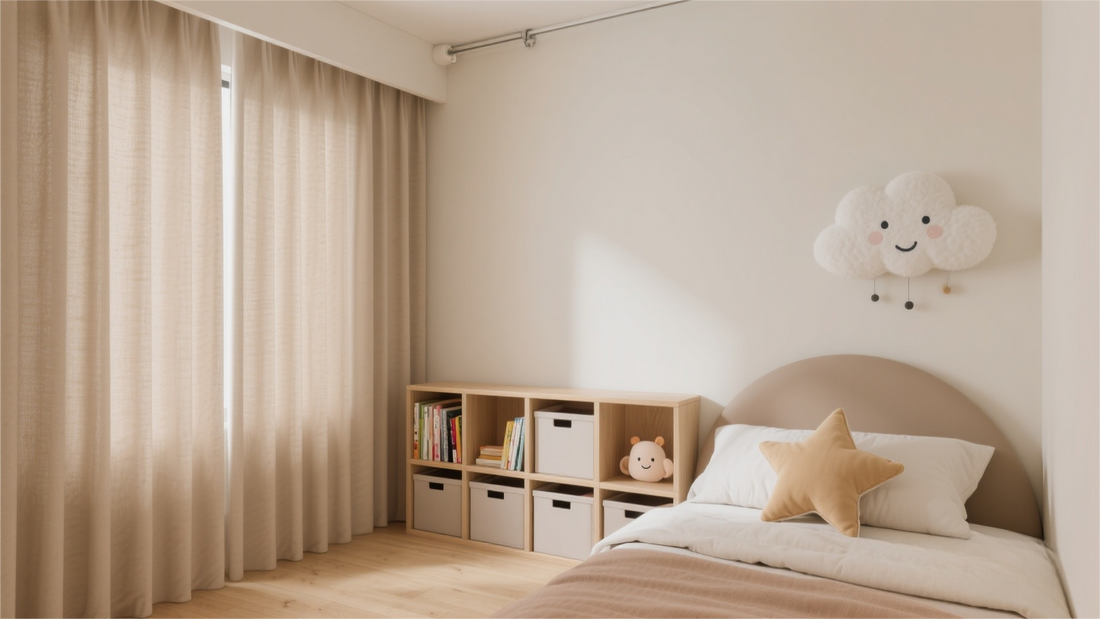
Children's room curtains: safe sleep & cheerful design
Good sleep, safe details, and cheerful colors – the right curtains make a child's room more peaceful, secure, and suitable for everyday use. This guide shows what's important when it comes to safety, light, and care.

Safety first: child-safe suspension & hardware
- Cord-free: Choose suspensions without drawstrings, such as eyelets, rod guides, or concealed gliders.
- Solid fastening: Always anchor the rail/support into a load-bearing surface; check the screws regularly.
- Plan the length carefully: Avoid ground breaks for running and play areas; a finish a few millimeters above the ground keeps the area clear.
- Restraint solutions: Place fabric holders high on the wall; use soft fabric loops instead of hard magnets.

Sleep quality: blackout & daytime sleep
Consistent darkness supports sleep – especially during naps and long summer evenings.
- Blackout/DIM-OUT: Blackout curtains reduce the amount of light entering and disrupt the rhythm less.
- Layering: Voile during the day for soft daylight and privacy, close blackout at night.
- Installation tip: Ceiling-high and generously extending beyond the window opening to the sides – this minimizes light gaps.

Material & Care: robust, washable, suitable for everyday use
- Easy care: Machine washable, crease-resistant qualities; quick reuse after washing.
- Robust: Tightly woven fabrics withstand small pulls and frequent opening and closing.
- Keep it fresh: Air and shake regularly; treat stains promptly with mild detergent.
Design that grows with your child: cheerful & timeless
Playful details can bring joy – and at the same time function for years.
- Motif ideas: Stars, clouds, fine dots or delicate stripes – friendly, but not overloaded.
- Color schemes: Soft pastels (sage, mist blue, sand) have a calming effect; an accent color on the cushions/rug is sufficient.
- Think in terms of zones: make the sleeping area quieter, the play/reading corner brighter and friendlier.

Room ideas by age
Baby & Toddler
Sturdy, opaque curtains for your evening routine; soft colors, minimalist patterns; no cords required.
Preschool & Elementary School
Layering for flexible brightness; reading corner with voile, glare-free homework area.
Teens
Calm, muted tones for focus and growth; subtle patterns, matte surfaces.
Measuring & Assembly Quick Guide
- Width: window opening + 30–50 cm (lateral overhang against light gap).
- Height: Ceiling to just above floor; clear of floor in play areas.
- Track: Mount ceiling-high; ideal as a double track for voile + blackout.
- Pleat allowance: approx. 2.0–2.2 times – enough volume, looks calm.
- Hardware: Check screws, raise brackets, plan child-safe access points.
Avoid common mistakes
- Width too short: Without overhang, light gaps will appear; allow 15–25 cm on each side.
- Play areas with a ground “break”: risk of tripping – better to keep them just above the ground.
- Bright patterns everywhere: Use motifs selectively and sparingly, leaving the sleeping area quiet.
- Glare at the desk: Matte fabrics and voile for diffused working light.
Checklist: Your children's room window
- [ ] Cord-free suspension (eyelets/rod pull-through/gliders)
- [ ] Ceiling-high, wall-wide installation; lateral overhang
- [ ] Layering: Voile during the day, blackout in the evening
- [ ] Easy-care, robust qualities
- [ ] Motif & color age-appropriate and calm
- [ ] Safe finish (in playing zones off the ground)

